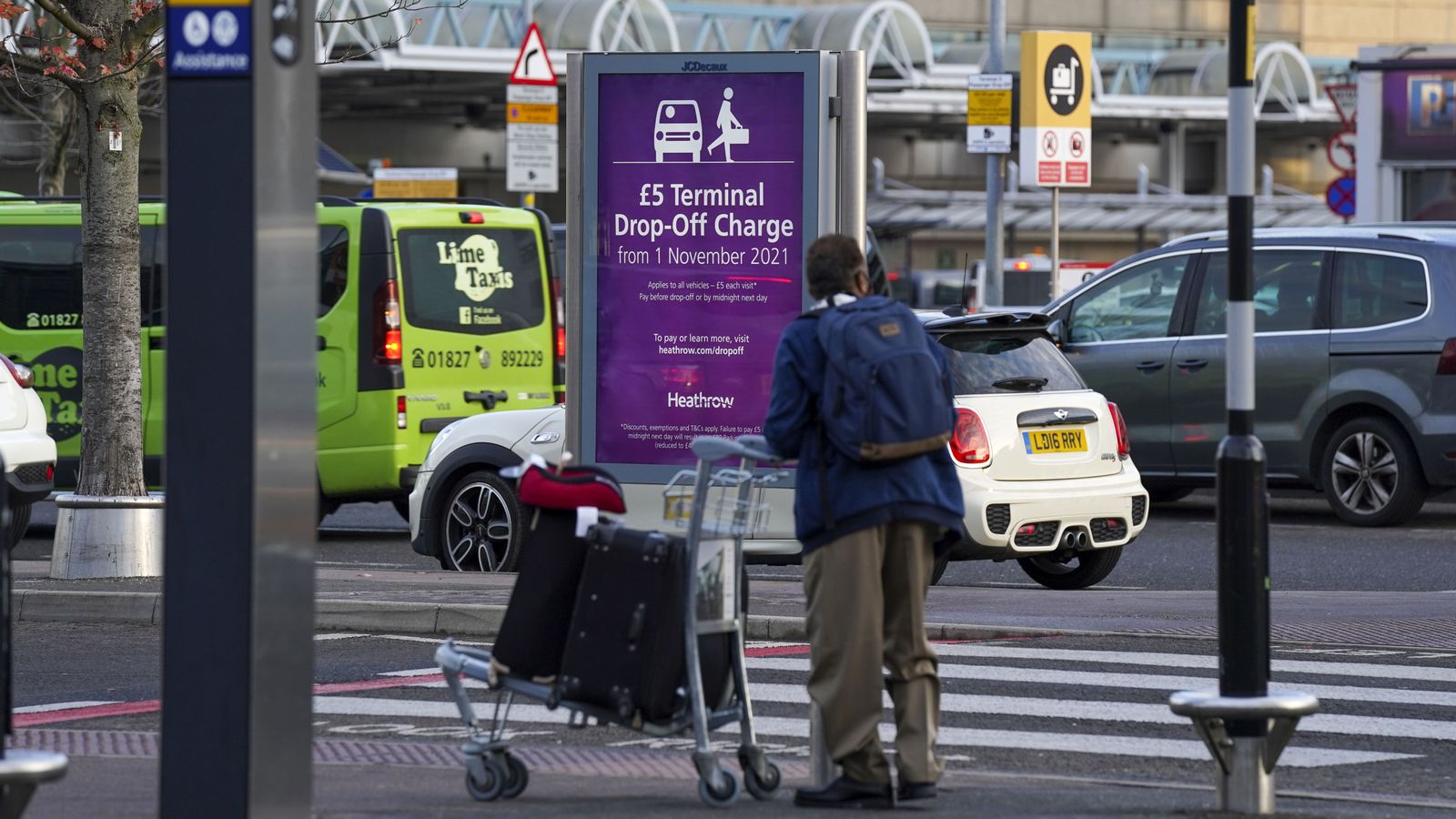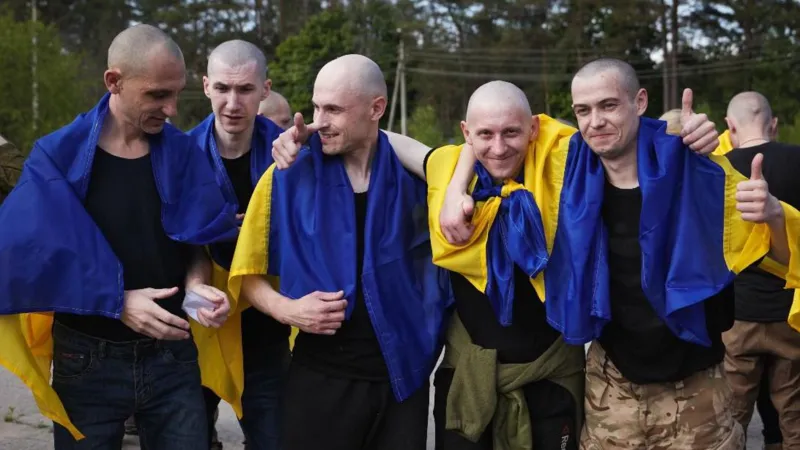Anti-Assad Syrians lead protests against prison torture by rebel group
Hay’et Tahrir al-Sham, formed out of a group with former ties to al-Qaeda, is accused of torturing prisoners to death.

Despite the dangers of dissent, people in northwestern Syria have been taking to the streets in recent weeks to protest an armed group formed out of an al-Qaeda breakaway faction.
The protests against Hay’et Tahrir al-Sham (HTS), which controls a large portion of Idlib province, began on February 25 in Sarmada, near the Syria-Turkey border.
Prompted by the treatment of prisoners by the group’s security arm, the General Security Service (GSS), protesters carry banners calling HTS prisons “slaughterhouses”. Protests with hundreds of participants have now taken place across Idlib.
In Binnish, 29-year-old Mohammed Ali Basha spent the night before an anti-HTS protest last week preparing flags and banners with his friends.
The activist painted three red stars on the green, white and black backdrop of the Syrian opposition’s flag. A large banner being prepared displays the message Basha and his fellow protesters want to put across: that the Syrian revolution – which began in 2011 – is not just against the country’s President Bashar al-Assad, but against all “tyrants”.
“All of them means all of them,” it says, a slogan long adopted by members of the Syrian opposition to indicate their opposition to autocrats of all persuasions. And for Basha, that includes HTS and its leader, Abu Mohamad al-Jolani.
“Our protests against HTS resemble our early demonstrations against Bashar al-Assad and his regime because in both cases we have taken to the streets to denounce injustice and preserve our dignity and freedom,” Basha told Al Jazeera. “Over the past few years, I have noticed the injustice practised against the people of the liberated areas [not controlled by al-Assad], and how the security branches affiliated with HTS have begun to commit the same criminal acts committed by al-Assad’s security forces, such as killing under torture and arbitrary detention.”
Ahmad Alhakim said he knows all too well what can happen in an HTS prison. His brother, Abdulqadir, was tortured to death in one, he told Al Jazeera.
Abdulqadir, 27, a father of three and a fighter in the Jaish al-Ahrar opposition group, was arrested by HTS last year on charges of dealing with foreign powers.
“They abducted my brother for 10 months without us being able to know his whereabouts, any information about him, or even appoint a lawyer to pursue his case,” Alhakim said.
In mid-February, Alhakim was told by a released detainee that Abdulqadir had died after being tortured in prison. His death was confirmed to Jaish al-Ahrar by HTS on February 22.
“We demanded that the General Security Service hand over my brother’s body, but they told us that they buried him and gave us the address of the burial place,” Alhakim said, describing it as a large trench where many bodies were buried – a mass grave. “There were many graves without names, only numbered.”
Calls to overthrow al-Jolani
It was Abdulqadir’s death that sparked the protest movement, which quickly spread to Idlib’s main towns.
In Binnish the next day, Basha and his fellow activists took their banners and flags and headed to the town centre to join the few dozen people who had gathered.
Much of the anger was directed towards the HTS leader al-Jolani, with protesters calling for his removal in areas controlled by HTS and its affiliated Salvation Government, and its replacement by an elected body.
“The era of slavery and tyranny ended with the start of the Syrian revolution in 2011, and the Syrian people, after paying dearly to gain their freedom and dignity, will not allow it to be taken away from them,” Basha said.
It is a brave stance to take. Idlib province largely remains under the control of Syrian opposition fighters, dominated by HTS after it gradually forced out other opposition factions and monopolised governance of the region.
HTS – designated a “terrorist” group by the European Union, Turkey and the United States – formed in 2017 as an alliance of several factions opposed to al-Assad in the country’s ongoing war. The principal force in the alliance was Jabhat Fateh al-Sham, formerly an affiliate of al-Qaeda known as the Nusra Front.
HTS has attempted to rebrand itself over the years, severing ties with al-Qaeda and portraying itself as a more moderate group with local aims, with al-Jolani even going as far as to give an interview to US media outlet PBS.
It became the most powerful rebel group in northwestern Syria but opposition to its rule is increasing, with activists deeming it vital to break the silence over the group’s violence and grip on security.
At an event in Idlib city, 30-year-old activist Abdulrahman, who did not wish to give his full name, reiterated the movement’s demands.
“We want the release of all prisoners of conscience, the disclosure of the fate of those missing in the prisons, and dissolving and restructuring the General Security Service,” he said.
As an initial response to the protests, HTS held meetings – chaired by al-Jolani – between ministers in the Salvation Government and community elites and village elders who presented the protesters’ demands and received promises to fulfil them.
“The protests … in the streets against Hay’et Tahrir al-Sham and the Salvation Government are natural and we do not view them in any other context,” said the HTS media office. “We’re confident that those who work make mistakes and all protests aim to correct these mistakes that have recently transpired.”
HTS told Al Jazeera the protesters’ demands were complex and resolving them would require some time. For example, it said, wider participation in the group’s leadership Shura Council would take time to recruit community representatives from different areas.
Anti-HTS protests have continued in Idlib despite these attempted assurances. However, as of yet, there have been no confirmed reports of protesters being detained by HTS.
A crowd of protesters, some flying the Syrian opposition flag, gather for a protest. The picture is taken from above.
Protesters, some with the Syrian opposition flag, demonstrate in Binnish [Ali Haj Suleiman/Al Jazeera]
Internal divisions
On July 16 of last year, the GSS announced that it had dismantled a spy cell working for Russia, the Syrian government and the US, leading to the arrest of several security personnel and leaders within its ranks, notably Abu Maria al-Qahtani – a Shura Council member considered al-Jolani’s number two.
He was acquitted and released earlier this month along with other security personnel, although it is unclear whether he continues to hold a leadership role.
“The popular movement today in Idlib is partly due to internal disagreements within Hay’et Tahrir al-Sham, meaning that conflicting parties within the organisation incite their supporters to participate in these protests,” Wael Alwan, a Syrian affairs specialist at the Jusoor Center for Studies, said.
“The second part of the movement consists of people who are taking advantage of the opportunity, whether they are social extensions of previous factions that the organisation has targeted, or they are people who have been greatly affected by the General Security Service and the organisation’s security grip,” Alwan said.
Alwan told Al Jazeera that HTS has to placate the popular movement by accommodating its demands as well as making and implementing promises, because putting the protests down by force is not an option, as that would only escalate protests and opposition.
“Perhaps HTS is betting on reconsolidating itself and regaining its centrality and its ability to solve internal problems, and then it may consider returning to … harsh security,” Alwan said.
But ultimately, for activists organising against HTS, their protests are a risk. The group is not known for its tolerance towards dissent, and many fear that it will eventually crack down on the demonstrations.
For Basha, that is still not enough to deter him.
“Since I joined the first protest against HTS, I knew that I might be arrested or even killed, but when I saw that the number of protesters was increasing with each passing day, nothing frightened me anymore,” he said.
“My family are the ones who encourage me to always defend the truth and not remain silent against injustice committed by any party – no matter the cost.”
-al jazeera







